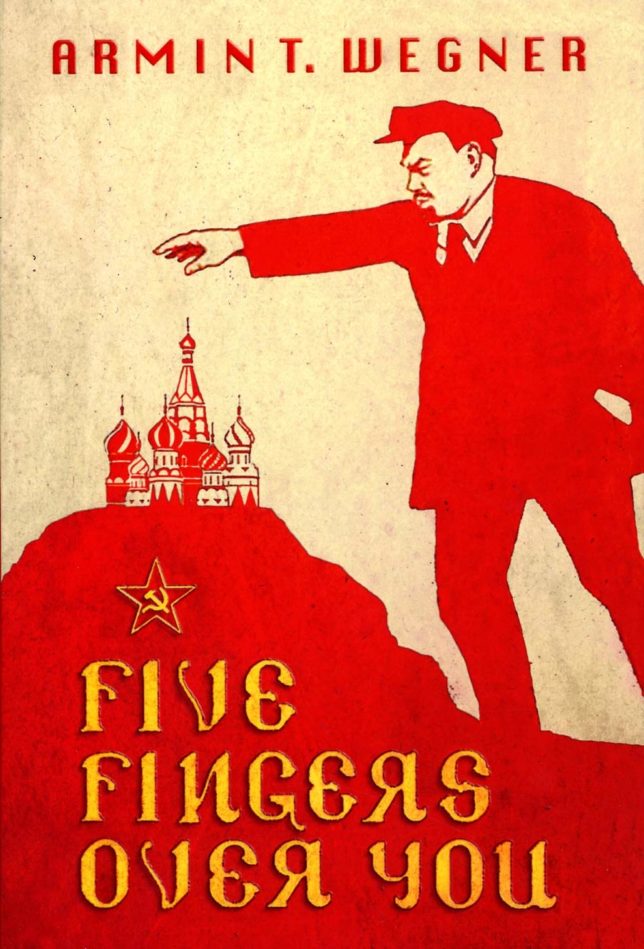Book Profile
Five Fingers over You: A Glimpse of the Early Soviet Union


Last month the Victims of Communism Memorial Foundation released a poll demonstrating that more than one-third of American millennials viewed communism favorably, 15 percent believed the world would be better off if the Soviet Union still existed, and 22 percent believed society would be better off if private property were abolished. This “historical amnesia” has developed in part because too few of us (millennial or otherwise) have read the works of people such as the German author Armin T. Wegner. Relatively unknown today, he was one of the rare writers who produced firsthand material on three of the 20th century’s great atrocities: the Armenian Genocide, the rise of Nazi Germany, and the early Soviet Union.
Wegner is principally known to history as a critical eyewitness to the Armenian Genocide, having smuggled out photographs and other documentation at considerable personal risk while stationed in the Ottoman Empire during the First World War. A lifelong human rights advocate, he published postwar material exposing the genocide and later became the only writer in Nazi Germany to publically denounce the persecution of Jews. He was arrested, tortured, imprisoned, and eventually exiled from his native Germany. He died in 1978 and was honored at official memorials in both Armenia and Israel.
Another important work of Wegner’s is little-known in the English-speaking world: an account of his four-month journey in the Soviet Union during the tenth anniversary of the Bolshevik Revolution. Released in 1930 under the title Five Fingers over You, it was not published in English until 2019, when the Armin T. Wegner Society of USA released a translation. The Capital Research Center recently acquired a copy of this book for our research archive.
Wegner’s candid observations provide a fascinating and sobering glimpse of Soviet society in 1927, during the window between Lenin’s death in 1924 and the Stalinist horrors of the 1930s.
Continental Europe at this time still bore extensive physical and psychological scars from the First World War, and Russia was especially hard-hit during the war and in the following years. Wegner, a decorated veteran, clearly felt antipathy towards the old authoritarian regimes of Europe. Indeed, he was sympathetic toward many of the Bolsheviks’ revolutionary aims, a sympathy that makes the contradictions he observed and the doubts he recorded all the more poignant. The book’s modern preface notes that Five Fingers over You was burned in Nazi Germany and banned in the Soviet Union.
Something that consistently struck Wegner during his travels was that, in contrast to the presumptions of an emerging socialist utopia common among European leftists at the time, the Soviet Union was in fact “a downright state-capitalist country.” He foresaw an emerging “class state” of privileged workers that would supplant the nobility of old as the country’s new aristocracy. “The factories of the new Russia,” he wrote, “have their communist ‘master of acceleration’ no less than the capitalist America.” In one memorable exchange, he asked Vladimir Mayakovksy if it was communistic for him, as a famous writer, to be paid a full ruble for each line published in a Soviet newspaper while lesser writers were only paid half that. Mayakovsky replied by comparing himself to a big factory and a lesser writer to a small one, “so the bigger one has to earn more!” This, of course, captures the essence of capitalism even within the mind of a revolutionary communist poet.
Wegner also repeatedly commented on how the Soviet Union had retained the worst authoritarian abuses of the Tsarist monarchy it replaced—hereditary nobility had simply been swapped out for state bureaucracy as the perpetrator. He wrote that he had observed “over and over” how “the officials of the state see the ordinary mass only as a herd of sheep who are left to their caprice.” Wegner’s mail was opened and read by censors, secret police burst into his room searching for contraband, he was required to be registered with the local police as an overnight guest in a private residence, and he found it terribly difficult to renew the visas necessary for travel within the Soviet Union. He also recorded credible rumors of Siberian prison camps where people were sent simply “because they claimed their right of free speech.” Today, of course, we know that this state repression was far more horrendous than Wegner could have imagined.
Undoubtedly the saddest of his writings concern the Soviet citizens themselves. He noted poverty, resignation, and suspicion everywhere, especially in the Caucasus. Many buildings had fallen into disrepair, leading him to remark that “they are no longer lovingly cared for, because they no longer belong to one but to all.” During his stay in Moscow, Wegner called the breakdown of the traditional family unit and the increasing transfer of childcare to the state “perhaps the most shocking experience in Russia today.” He wrote that “No doubt . . . sooner or later the planned human breeding will come.” Children that he encountered “don’t look like normal children.” Boys and girls alike had uniformly shaved heads even as kindergarteners. They didn’t know any fairy tales, were discouraged from personal ambition, and were taught an “almost ascetic denial of their own happiness.” Summing up the tragic irony of this new state built on the backs of the heretofore oppressed proletariat, Wegner concluded that “the ants do not sing. They work.”
Still, there was much that Wegner admired. He built close relationships with many of the people he met along the way and was impressed, if also a bit unnerved, by the monumental industrial development he saw. He also related an affection for Russian culture, at one point wondering to himself whether it was really communism and not simply the Russian people themselves that made such a strong impression upon him. Wegner wrestled with this throughout the book, and perhaps best-encapsulated his struggles with the obvious flaws of communism by asking whether one can “approve of an act as a whole, or just a part of it, without affirming its horrors—while those horrors are part of its essence?”
Five Fingers over You, which mostly consists of chronologically arranged diary entries and letters, reads like a window into Wegner’s thoughts about what he saw at the time he saw them. The ninety years of historical hindsight through which his words can now be viewed provide important insight into how the warning signs of human disasters are perceived by those who witness them at their earliest stages. Wegner, who spent his life confronting wickedness wherever he saw it, certainly could not have fathomed that the communist ideology he was trying to understand at this nascent stage would ultimately lead to the deaths of upwards of 100 million people. Today, we have Five Fingers over You as both a treasure of personal anecdotes and an ominous harbinger of things that had yet to come. The disconcertingly high number of modern Americans who evidently consider communism as something other than a tremendous human tragedy recalls the maxim that those who do not know history are doomed to repeat it.



